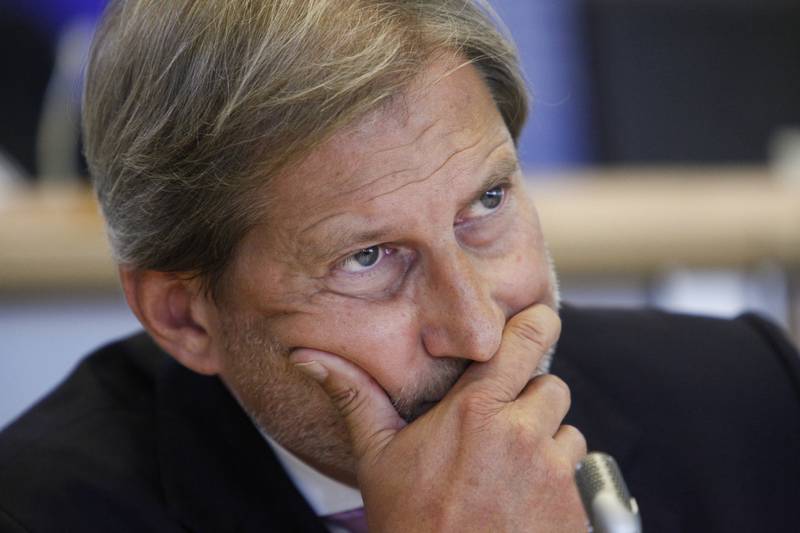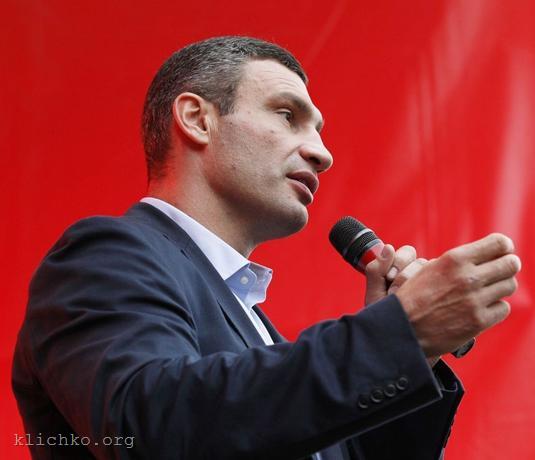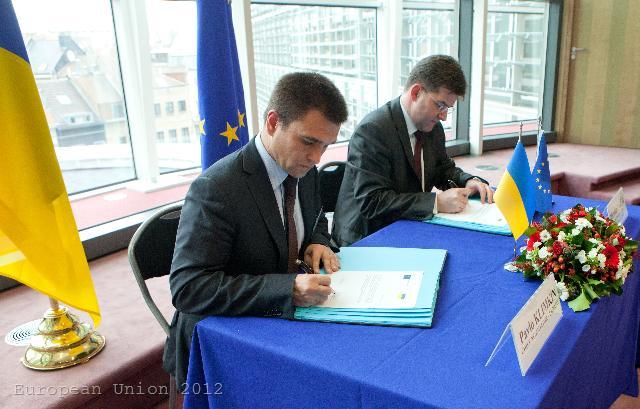Mikola Baltajy: Ukraine's Integration in EU Cannot be at the Expense pf Relations with Russia
Adelina Marini, March 22, 2012
Ukraine's strategic goal to one day become a fully fledged member of the EU has not changed. Only the accents have changed - at the moment the Ukrainian government is focusing on actions not on empty words, said in an interview for euinside Ukraine's ambassador to Bulgaria H.E. Mikola Baltajy in brilliant Bulgarian language. With Ambassador Baltajy we first met at a conference, organised by the Polish embassy in the end of last year about the next multiannual financial framework (MFF) of the EU, when I thought he was a man who is vividly interested in everything, related to the EU through the prism of the country he has been working in for a year now. Another pleasant impression is the total lack of barriers when organising the interview and the kindness and hospitality which our team received in Ukraine's embassy in Bulgaria.
At the moment Kyiv is blamed by Europe and USA of retreat from reformist efforts  and democracy because of the several controversial trials against influential opposition figures, among whom former prime minister Yulia Tymoshenko. Mr Baltajy thinks, however, that Ukraine is changing but some changes require time and patience. They also require wisdom. Regarding the claims of politically motivated trials, the Ukrainian ambassador recalled that in his home country currently in force is a Penal Code from 1962, which does not correspond to the modern European standards, in his words. He added that measures are being undertaken for amendment of this code - a key requirement of the European Union in order the signing procedure to be launched of the agreed in the end of last year Association Agreement, part of which is the first in its kind agreement for Deep and Comprehensive Free Trade Area.
and democracy because of the several controversial trials against influential opposition figures, among whom former prime minister Yulia Tymoshenko. Mr Baltajy thinks, however, that Ukraine is changing but some changes require time and patience. They also require wisdom. Regarding the claims of politically motivated trials, the Ukrainian ambassador recalled that in his home country currently in force is a Penal Code from 1962, which does not correspond to the modern European standards, in his words. He added that measures are being undertaken for amendment of this code - a key requirement of the European Union in order the signing procedure to be launched of the agreed in the end of last year Association Agreement, part of which is the first in its kind agreement for Deep and Comprehensive Free Trade Area.
Moreover, Ambassador Baltajy underscored, the issue of trials should not be politicised. "Solution must be sought only in the legal field". On the occasion of the claims of many analysts and the general feeling in the EU that Ukraine is still unable to choose its long term partner between the EU and Russia, Mikola Baltajy recalled the very well known Ukrainian position that European integration is of utmost significance for his home country but it cannot be at the expense of relations with Russia. He was  cautious in his comments about the election of Vladimir Putin again for president of Russia, but said that the main problem which had to be solved between the two countries is the gas problem, which is not only bilateral.
cautious in his comments about the election of Vladimir Putin again for president of Russia, but said that the main problem which had to be solved between the two countries is the gas problem, which is not only bilateral.
Also interesting were Ukrainian ambassador's comments about the way in which the EU understands Ukraine. He used the division, introduced for the first time by the former hardline American secretary of defence Donald Rumsfeld, of new and old Europe, by underscoring that in old Europe in general there is a lack of adequate understanding of the processes in Ukraine. This is why, he said, countries like Bulgaria are very important. And namely when discussing Bulgaria in our conversation the ambassador spoke with very measured words, which however are very telling. For instance, he pointed out that Ukraine was carefully following the processes in the EU, including in Bulgaria and was learning both from the positive and negative experience. According to him, Bulgaria can provide valuable experience from its path from totalitarianism to fully fledged European membership, although "we understand the sensitivity of this matter, as far as Bulgaria herself has not yet joined Schengen".
More on the topics we discussed with Ambassador Baltajy in the video.
Transcript of the interview
euinside: Let me thank you again that you have accepted us for an interview and if we could make a short review. At the moment the situation between the EU and Ukraine is quite sensitive. What is the situation in Ukraine right now? Is there some kind of a shift?
Mikola Baltajy: I would like to say that at the moment Ukraine is going through a very responsible stage of its development. A stage of economic reforms and modernisation. After the Party of Regions came to power in 2010 deep economic reforms have been launched. Frankly, this was lacking since 1991 after Ukraine gained its independence. We lost a lot of time and opportunities. I want to say that we already feel the first results - firstly with the stabilisation of the political situation in Ukraine and secondly the Ukrainian economy is returning on the growth path. And in 2011 we have economic growth of 5.2%, inflation is around 4.6%. These numbers are not bad.
euinside: There were political problems because of the trial against former PM Ms Tymoshenko. The opposition left parliament. Are now things back to order - in February President Viktor Yanukovych called on the opposition to return to parliament, are things OK now?
Mikola Baltajy: The opposition is in parliament. I even want to say that we have adopted a law for the parliamentary elections - in end-October there will be parliamentary elections in Ukraine - and the opposition supported this law but if it is talked about our problems in the dialogue with the European Union, you know that we have finalised the Association Agreement and we intend to initial it by the end of the month. A next step will be signing and then ratification. This is linked by the EU side with the internal political situation in Ukraine, with the trial of Tymoshenko and of course the opposition supports this idea.
euinside: Are you concerned that the signing of the agreement can in one way or another ... the EU unequivocally said that until the problem with politically motivated trials is resolved the signing procedure will not start?
Mikola Baltajy: We take this into account. You probably know that there were a number of resolutions of the European Parliament, of the Parliamentary Assembly of the Council of Europe (PACE), etc. but we should not forget that this trial has a number of aspects - political, economic, psychological, etc., and it is very sensitive. I would like to say that the very verdict of the court - you know that she was sentenced to 7 years in prison - is based on a Penal Code of 1962 and naturally it does not respond to the modern European standards. So, at the moment measures are under way this code to be amended in order to correspond to the European norms and standards. We are aware that the decision must be sought only in the legal field, not in the political. Politicising this issue will hardly bring the right decision.
euinside: There is a feeling in the EU that as if Ukraine is not quite sure whether it wants to further integrate in the EU. Do you share this feeling? Is there something in this?
Mikola Baltajy: I cannot share this because generally - and you asked me in the beginning of our conversation - generally, European integration and its final goal, which is EU membership, this is ever since 1991, and in fact nothing has changed since then, it is being spoken of our strategic goal - EU remains our strategic partner and only here Ukraine and the Ukrainians see their future. Another problem is that accents change on this path and here the accent is, the Ukrainian authority's attention is focused more on real actions and not on empty words, and real actions are to realise our main projects. These are the Association Agreement with the establishment of a Deep and Comprehensive Free Trade Area. This is also visa dialogue. At the moment we are moving on to the second stage in realising the action plan for visa liberalisation. There are very important guidelines in the sectoral cooperation with the EU, so I wouldn't share such a feeling and this opinion. As the Russian Federation is important, and we cannot integrate with the EU at the expense of the Russian Federation or at the expense of our relations with Russia, European integration as an ideology and as a strategy of Ukraine's foreign policy is maintained.
euinside: Do you expect any, albeit indirect, obstacles for the Eurointegration process of Ukraine to get stuck now with the election of Vladimir Putin again for president? Do you think there will be obstacles?
Mikola Baltajy: Always when a new head of state comes to power, in Ukraine and possibly in other European nations, there are hopes that the bilateral relations will be facilitated, although the new head of state of Russia is for us very well known, but I think the main thing is that we respect the choice of the Russian people. They chose a new president and we also expect that in our relations with the Russian Federation there will be changes. The main thing for us is the removal, the solving of a number of issues which are being dragged ever since the 90-ies, and one such problem, of course, is to find a solution to the gas issue.
euinside: Yes, this problem affect us all.
Mikola Baltajy: It affects entire Europe. Delimitation of the borders between Ukraine and the Russian Federation, and there we have achieved progress and a solution.
euinside: Is Ukraine concerned by Russia's plan to build South Stream and thus avoid in fact Ukraine as a transit country?
Mikola Baltajy: We don't hide that this affects our economic interests and we say this to our partners both from the Russian Federation and the EU. And, on our part, we too, we do not keep this secret, are looking for alternative sources and routes. This is normal and this is a European practise.
euinside: Is there something, which the EU does not understand in terms of Ukraine, which it has to?
Mikola Baltajy: I think yes. The EU is a community of states. States means politicians. The countries are from new Europe, from old Europe and my feeling is that not always, especially on behalf of old Europe, there is an adequate comprehension of Ukraine and of the processes that unfold in my country. And maybe this is natural. This is why we appeal mostly to our partners from Eastern and Central Europe, from Baltia, such countries like Bulgaria, because they walked this path or are in a stage of walking, even when we talk about legislation. Of course, we are trying to do everything possible to synchronise Ukrainian legislation with the European norms and standards, but this does not happen at once. This requires efforts, time and has internal specifics of its own. Sometimes, haste is not recommended, like for example in the case of the Electoral Code. So, sometimes, this comprehension is not always there on EU's side and I would like to say that sometimes this requires more wisdom. Wisdom is required from both sides in fact. This is a dialogue between Ukraine and the EU.
euinside: Do you receive help from Bulgaria? Do you have any consultative relations because in Bulgaria, including in terms of the Electoral Code, we walked on that path and I think we are still on it?
Mikola Baltajy: Of course, for us Bulgaria is a very important country as it is part of the EU and as a country, which moved from the path of totalitarianism to democracy and is still moving from administrative economy to market economy, and Bulgaria's experience is very interesting for us. It doesn't matter if it is positive or negative, we study it very carefully and the Electoral Code is not an exception. But, we consult with each other on other issues as well. Here come delegations of experts from Ukraine. Just one example - last year here was a government delegation, led by Deputy Prime Minister Sergey Tigibko, who were studying Bulgaria's experience in pension reform. Moreover, former deputy prime minister Lidia Shuleva is working as a consultant to the Ukrainian government in terms of administrative reform.
euinside: But probably you receive more help from Poland? It is evident that Poland is very much looking to Ukraine and is trying to help in order to draw the attention of the rest of the EU partners to the need of communicating with Ukraine. Do you have such a feeling?
Mikola Baltajy: Of course! Poland is advocate of ours. Poland, together with Sweden, initiated this project Eastern Partnership etc., but we shouldn't underestimate Bulgaria's role as well, as a member of the EU, and I want to say that here in Sofia we have understanding and support from Bulgarian politicians, diplomats, members of parliament, businessmen, representatives of the municipal authorities. Although, we understand the sensitivity of the matter, given that Bulgaria still is not a member of Schengen, for instance.
euinside: Besides, we also have complex relations with Russia, which probably is also a problem one way or another. Would you agree?
Mikola Baltajy: Maybe this is so. There is specificity in relations, in bilateral relations, always. The main thing here is to take into account the interests of the other side as well, when negotiating or in dialogue. This is, I think, very important.
euinside: Do you expect Bulgaria to contribute more? Do you feel that more can be done in the bilateral relations?
Mikola Baltajy: A very good question. Of course, there always is and one always wants more support but after all we are realists and we have to take into account that every nation provides support that is adequate to its possibilities. It is possible more support to be needed but I think that this is a matter of our bilateral consultations, negotiations and we are grateful to the Bulgarian government, the Bulgarian diplomacy for the support and the Eurointegration aspiration of Ukraine.
euinside: Last week Enlargement Commissioner Stefan Fule said in the European Parliament on the occasion of Macedonia or Bosnia, one of the two - they were in a common debate - that in fact we are OK when our neighbours are OK. So, from this point of view Ukraine - we are separated only by the Black Sea - practically is our neighbour and maybe it is good our government to have this perspective, no matter that we all have a lot of domestic troubles but we should not forget our neighbours. Do you agree?
Mikola Baltajy: I fully share you opinion, which is valid for Bulgaria. For Ukraine as well. A nation cannot afford not having good relations with its neighbours and this is a priority of our foreign policy from the very beginning. Regarding Bulgaria, of course we are neighbours through the Black Sea and here there are a lot of opportunities for cooperation in this region, like for instance the realisation of the Danube Strategy. There are also other regional projects. This year we are presiding over the Central European Initiative - a unique international structure, where various countries participate and where the rich experience of European integration is shared. We do that.
euinside: Thank you, Mr Ambassador!
Mikola Baltajy: Thank you!.
 Johannes Hahn | © European Parliament
Johannes Hahn | © European Parliament | © klichko.org
| © klichko.org | © European Union 2012
| © European Union 2012